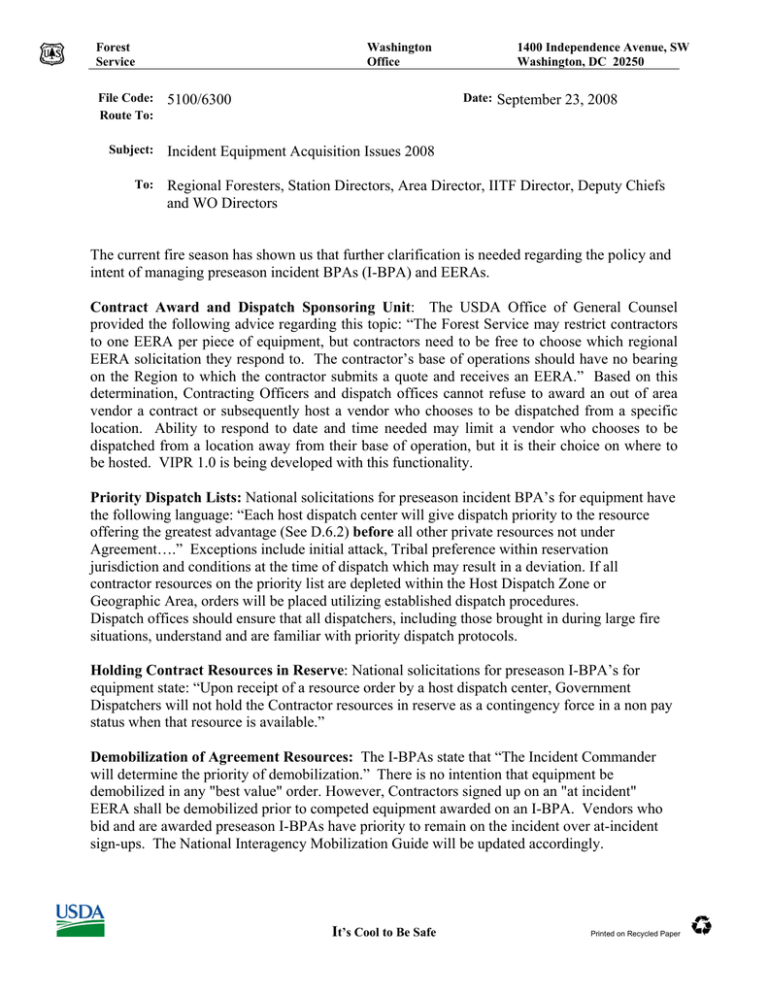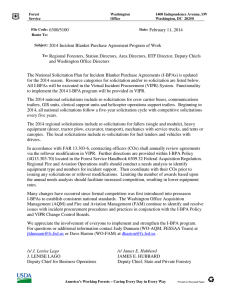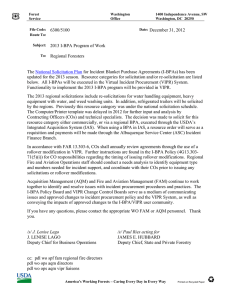5100/6300 September 23, 2008
advertisement

Forest Service File Code: Route To: Subject: To: Washington Office 1400 Independence Avenue, SW Washington, DC 20250 Date: September 23, 2008 5100/6300 Incident Equipment Acquisition Issues 2008 Regional Foresters, Station Directors, Area Director, IITF Director, Deputy Chiefs and WO Directors The current fire season has shown us that further clarification is needed regarding the policy and intent of managing preseason incident BPAs (I-BPA) and EERAs. Contract Award and Dispatch Sponsoring Unit: The USDA Office of General Counsel provided the following advice regarding this topic: “The Forest Service may restrict contractors to one EERA per piece of equipment, but contractors need to be free to choose which regional EERA solicitation they respond to. The contractor’s base of operations should have no bearing on the Region to which the contractor submits a quote and receives an EERA.” Based on this determination, Contracting Officers and dispatch offices cannot refuse to award an out of area vendor a contract or subsequently host a vendor who chooses to be dispatched from a specific location. Ability to respond to date and time needed may limit a vendor who chooses to be dispatched from a location away from their base of operation, but it is their choice on where to be hosted. VIPR 1.0 is being developed with this functionality. Priority Dispatch Lists: National solicitations for preseason incident BPA’s for equipment have the following language: “Each host dispatch center will give dispatch priority to the resource offering the greatest advantage (See D.6.2) before all other private resources not under Agreement….” Exceptions include initial attack, Tribal preference within reservation jurisdiction and conditions at the time of dispatch which may result in a deviation. If all contractor resources on the priority list are depleted within the Host Dispatch Zone or Geographic Area, orders will be placed utilizing established dispatch procedures. Dispatch offices should ensure that all dispatchers, including those brought in during large fire situations, understand and are familiar with priority dispatch protocols. Holding Contract Resources in Reserve: National solicitations for preseason I-BPA’s for equipment state: “Upon receipt of a resource order by a host dispatch center, Government Dispatchers will not hold the Contractor resources in reserve as a contingency force in a non pay status when that resource is available.” Demobilization of Agreement Resources: The I-BPAs state that “The Incident Commander will determine the priority of demobilization.” There is no intention that equipment be demobilized in any "best value" order. However, Contractors signed up on an "at incident" EERA shall be demobilized prior to competed equipment awarded on an I-BPA. Vendors who bid and are awarded preseason I-BPAs have priority to remain on the incident over at-incident sign-ups. The National Interagency Mobilization Guide will be updated accordingly. It’s Cool to Be Safe Printed on Recycled Paper Regional Foresters, Station Directors, Area Director, IITF Director, Deputy Chiefs and WO Directors 2. At-incident EERAs: The Interagency Incident Business Management Handbook States: “An incident agency warranted Contracting Officer working on consent of the Incident Agency Administrator may award seasonal EERAs at the incident depending on need. EERAs negotiated at an incident will only be in effect until the end of the incident. …at-incident seasonal EERAs may not be awarded unless <pre-season competed> resources have been depleted.” In addition, Regions should be using standard rates for at-incident sign-ups; if negotiation is necessary, it is the responsibility of the C.O. to negotiate reasonable rates based on the national standards for equipment typing and methods of hire in the Interagency Incident Business Management Handbook which can be found at http://www.nwcg.gov/pms/pubs/iibmh2/chapter_20_section_28_exhibit_01.pdf VIPR Implementation: Concerns regarding the impact that VIPR implementation may have on AQM and FAM personnel in the coming months have been identified. We certainly understand these concerns and want to assure you that the implementation efforts have been planned to minimize this impact to the field as much as possible, by performing as much work as feasible at the national levels and avoiding the major incident season. We are confident that the short-term impacts will pay off with increased efficiency in the very near future. We jointly endorse VIPR as an Acquisition system in direct support of obtaining incident resources for Fire and Aviation Management. Several issues regarding the national solicitations for preseason incident BPA’s, VIPR implementation, availability of incident procurement specialists, training of CORs and inspectors for incident contracts and others have been identified by the field this year. Acquisition Management and Fire & Aviation Management are working through the issues and concerns, and will be issuing additional communication this fall. In light of all of the changes over the past two years, excellent work has been accomplished to work toward our goal of increasing competition for incident equipment, implementing national standardized templates and equipment standards, and increasing our capacity of qualified inspectors and contract administration skills in Operations and Logistics personnel. As we proceed in the implementation of these items, we encourage continued dialogue to ensure our processes are as efficient and productive as possible. /s/ T.C. Harbour /s/ Ronald E. Hooper TOM HARBOUR Director, Fire and Aviation Management RONALD E. HOOPER Director, Acquisition Management cc: pdl wo ops aqm directors pdl wo spf fam regional fire directors Ronald Wester Mary A Szymoniak Neal Hitchcock pdl wo ops aqm eatis vipr liaisons Barbara Loving



